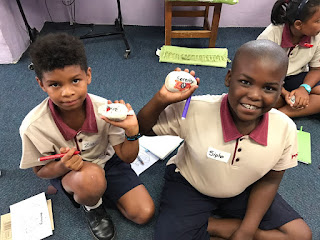 |
| How high can you go? |
When we adults were at
school, intelligence tests only told our teachers and parents about whether we
were mathematically and linguistically intelligent. Those who struggled to read
or compute were considered not to be ready to succeed in the world. In reality,
we know that this is not true as many really successful people were not great
at school!
In 1983, Howard Gardner wrote
a book which had us new teachers really excited – he declared that actually
people had 7 intelligences and that we as teachers should be encouraging
children to develop in all 7. Later he reviewed his idea by joining
‘interpersonal’ and ‘intrapersonal’ intelligences together into emotional
intelligence. He was also one of the first ‘thinkers’ to suggest that there was
also a ‘philosophical intelligence’.
 |
| Team building at its best! |
Daniel Goleman then continued
the intelligence discussion with his book in 1985. He said that ‘star
performers had significantly stronger relationship and personal networks than
average performers’. He joined Richard Boyatzis to declare later that EQ was
made up of skills in 4 quadrants: self-awareness, self-management, relationship
skills and ‘other’ awareness. After research Goleman and Boyatzis found that
self-awareness needed to be grown before any of the others as a person couldn’t
do any of the others if they weren’t aware of their feelings etc.
Cindy defines spiritual intelligence
as ‘ the innate human need to connect with something larger than ourselves’.
She says this has 2 components: a horizontal and a vertical component. The
vertical component is obvious – the connection to a higher being, and the
horizontal component is ‘service to our fellow human beings and to the planet
at large’.
Pinelands North Primary has
always developed spiritual intelligence in our pupils. Leadership activities
like LEAP, which was put together for grade 4 to 7 pupils in the first week of
our 2017 school year, encourage children to reflect on their own growth in
kindness, persistence, generosity of spirit and that of others. These
activities also encourage children to be relentless in their pursuit of life.
Children learn to reflect on how they can be more courageous in tackling life’s
issues themselves, and then help others battling in life too.
As part of this programme we
have developed a pathway of thought in the quiet quad alongside the hall.
Children are encouraged to go there if they are struggling with the ‘boulders’
in their lives, to reflect, have some quiet time or just to sit and think. We
are also currently building a labyrinth in another quad, Beck se Plek, and will
be changing the ‘flooring’ to various different textures.
 |
| Creating thinking stones for the Quiet Quad |
The animals at our school
create beautiful opportunities for empathy development - duckling dying after
being attacked by a crow IS sad, but is also necessary as food for the crow.
Not chasing our animals is another thing we insist on – questions are asked
which allow children to reflect on their feelings about being chased, and so we
help them understand how animals feel.
 |
| Creating 'flags' for our Quiet Quad |
Cindy ends her article by
explaining why she thinks spiritual intelligence is so important in our current
world. She correctly notes that most wars are caused by diverse religious
beliefs, so if we teach children to ‘behave with compassion and wisdom, while
maintaining inner and outer peace, regardless of the circumstances’, we will be
creating adults for the world who can become empathetic presidents of countries
who will think twice and negotiate in faith before considering invading another
country.
Family dinner times are
perfect times for families to share thoughts that help children learn about
spiritual intelligence. While having supper, ponder some of these questions as
a family:
What did you do today that showed your friends you can
be generous?
How were you courageous this weekend?
Tell me one wise thing your teacher told you today?
Why was it ‘wise”?
What will you do the next time you have a fight with
your siblings, that shows that you can be forgiving?
Obviously the adults that
children come into contact with need to model these spiritual intelligent
behaviours too. They have a very important role to play in showing children how
to be respectful of other religions and peoples, how to reconcile family
arguments, and how important it is for people to have some time in their week
when they are mindful, meditate or practice their beliefs. By doing this, you
are creating spiritually intelligent adults for 2030!
Additional reading: Google
‘spiritual intelligence’ or go to www.deepchange.co
No comments:
Post a Comment